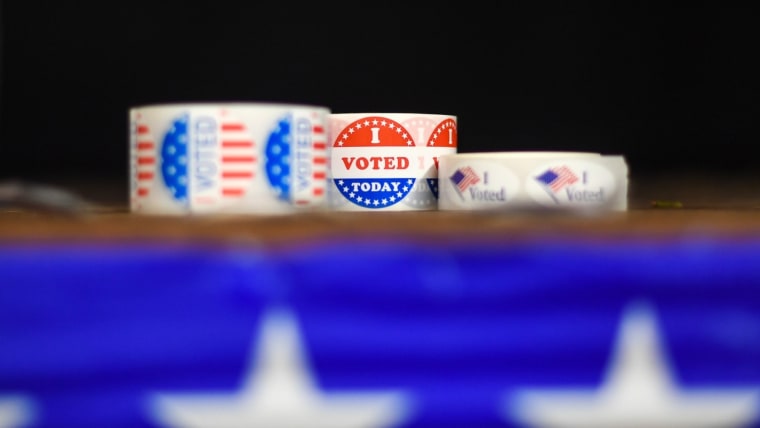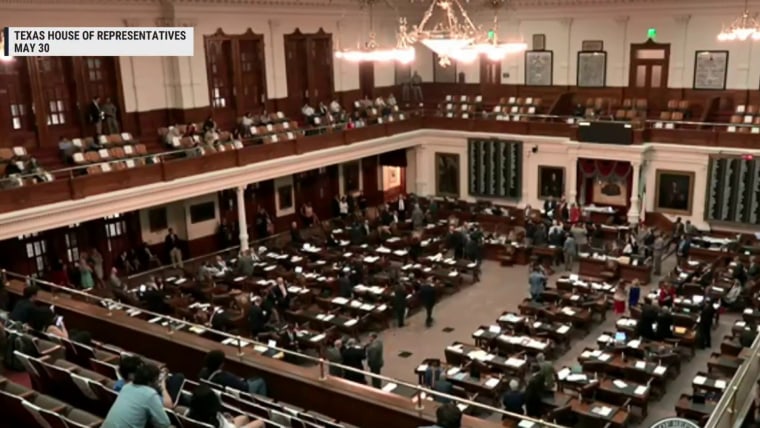Texas again takes center stage in the national battle over voting rights this week as the state Legislature reconvenes for a 30-day special session called by Gov. Greg Abbott. Lawmakers will consider an agenda topped by conservative hot-button issues including, in Abbott’s own words, “legislation strengthening the integrity of elections in Texas.”
Texas again takes center stage in the national battle over voting rights this week.
Texas Democrats successfully obstructed Republican efforts to pass restrictive “election integrity” legislation during a previous session that concluded in May. But passing such legislation, which echoes similar laws introduced in other GOP-led states, is a top priority of Texas Republicans, and Democrats face a steep uphill battle in their efforts to defeat it again in the special session.
Texas Democrats, besieged minorities in both houses of the Texas Legislature for almost two decades, received a rare burst of national attention after their caucus in the Texas House staged a Memorial Day weekend walkout to derail a high-profile and highly restrictive omnibus election bill, Senate Bill 7. The legislation would have empowered local judges to throw out election results without clear evidence of fraud, shortened Sunday voting hours, increased the exposure of poll workers to criminal penalties, empowered poll watchers and a raft of other measures large and small that Democrats — as well as legal experts — claimed added obstacles to voting while criminalizing routine, unintentional errors by voters and poll workers in the name of increasing “election integrity.”
For all the drama of Texas Democrats’ successful scuttling of S.B. 7, the vagaries of the design of Texas government and the politics of a looming off-year election will make it very difficult for Democrats to continue blocking Republican-designed voting legislation. Behind Texas Democrats’ Instagrammable moments with Democratic members of Congress in Washington, D.C., lurks a harsher reality. The best prospects for thwarting Republican efforts in Texas still rest with national legislation that would either render such legislation moot or would increase the available tools for federal oversight and litigation (both of which are struggling in the U.S. Congress). Texas Democrats’ capacity to resist at the state level is limited by their minority status in the Legislature and their total absence from any executive branch offices.
But Democrats can still claim some success in their efforts, even if Republicans eventually pass another bill during the special session. The public attention they brought to some of the most controversial and least-vetted of the measures in S.B. 7 — the shortening of Sunday voting hours and the lowering of the threshold for judicial invalidation of elections subject to claims of voting fraud — has led key Republicans to vow that these measures won’t return (in some cases after implausible suggestions that no one really knows how they got in the bill in the first place).
These small wins notwithstanding, the rules governing the special session allow Abbott to limit the agenda.
These small wins notwithstanding, the rules governing the special session allow Abbott to limit the agenda. This in turn enables legislative Republicans to move priority election legislation more quickly through the process of committee hearings.
Public speculation abounds in Austin about another attempt to break quorum, which would likely require Democrats to flee out of state (as they did in a previous fight over redistricting over a decade ago). For all the drama of such a gesture, it would be a difficult tactic to maintain. Low-paid “citizen legislators” in Texas rely on their day jobs for a living. And given Republican commitment to the issue, it’s unclear what the Democrats’ endgame would be. Upon their inevitable return, they would remain the minority party they were when they left.
Another Democratic quorum break is further complicated by the fact that Abbott used his line-item veto power to invalidate funding for the entire legislative branch for the coming fiscal year, beginning Sept. 1. This move scarcely affects legislators, whose paltry salaries ($7,200 a year) are guaranteed by the Texas Constitution. But it heavily impacts the legislative staff of both parties as well as the permanent bureaucracy that supports the legislative process. Were Democrats to flee the state to paralyze the legislative process, they would run the risk of essentially defunding their branch of government — and causing hardships for staff members they rely heavily on and, in many cases, with whom they have close working relationships.
In addition to the intricacies of the legislative process, the politics of next year’s statewide election in Texas ensure a no-holds-barred effort by Republican incumbents to deliver an election bill they have repeatedly told their voters is essential to protecting the integrity of elections, and which many GOP incumbents see as vital to their own self-interest.
Even prior to former President Donald Trump’s dark claims of rigged and stolen elections, Texas Republicans have repeatedly claimed that voter fraud was rampant. This despite the widely acknowledged fact that reported cases of voter fraud or other irregularities are few and far between and that successful prosecutions are still rarer. Yet the effects on voters of Republican elected officials’ tendency to publicize their few legitimate examples, as well as Trump’s flogging of his own unsubstantiated claims, repeatedly show up in public polling of Texans’ attitudes toward elections.
Examples of these effects were prominent in a June University of Texas/Texas Tribune Poll. More than 3 in 5 Texas Republicans said the voters either frequently (20 percent) or sometimes (44 percent) knowingly break election laws. Nearly 1 in 3 (31 percent) said ineligible voters frequently vote in Texas elections. An overwhelming majority of Republicans — 87 percent — said the Texas election system doesn’t discriminate against people of color. (By comparison, 77 percent of Democrats thought the system does discriminate.)
These attitudes among the Texas GOP rank and file can be expected to embolden renewed efforts by the Republican incumbents — from the governor to individual legislators — to ensure passage of revamped “election integrity” legislation. Democrats were able to celebrate a rare moment of victory over Republicans’ efforts to maintain an electorate that has kept them in power for two decades and counting. Expect those same Republicans to use that power to render Democrats’ victory in May a pyrrhic one.
Source: | This article originally belongs to Nbcnews.com












